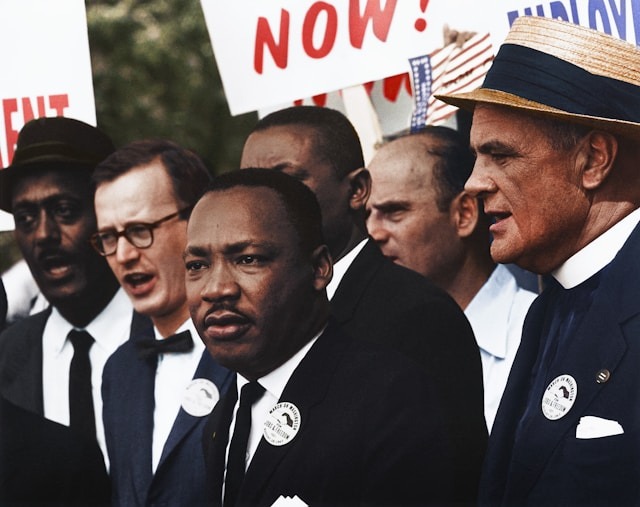How to get the full measure of Martin Luther King Jr in contemporary literature
For more than three decades, the third Monday of January has been dedicated to memorialising the legacy of Martin Luther King Jr’s fight for racial equality.
King spearheaded the civil rights movement for much of the twentieth century and left a lasting impact on American society not only as a political and cultural figure, but as one of the country’s most effective and emotive speakers.
In spite of the persecution and hatred rooted in America’s streets, King dedicated his life to serving others in the face of brutality. Yet, his memorial day has been undoubtedly outshone this year by the 2025 inauguration of former president Donald J. Trump. In lieu of the politically charged events of 20 January, continuing the perforation of King’s legacy has become more important than ever. His legacy has trickled down into the works of many writers, poets, and novelists who continue to honour the leader’s life work following his assassination.
To truly understand the efforts of Martin Luther King Jr, it is of continued importance to engage in the literature which details the broader struggle for racial justice within the American civil rights movement.
To truly understand the efforts of Martin Luther King Jr, it is of continued importance to engage in the literature which details the broader struggle for racial justice within the American civil rights movement. In his appropriate definition of ‘America in the King Years’, Taylor Branch’s trilogy provides a thoughtfully told account of Martin Luther King’s early years and rise to greatness. The series captures one of the most crucial passages of 19th century America by transporting the reader to Birmingham, Alabama during the wake of voter registration drives and the murder of Medgar Evers. If you’re seeking a starting point to understand the war against racial separatism in the mid-twentieth century, Branch’s trilogy can be considered one of the most compelling works to date, capturing the Civil Rights Movement as one of America’s most pivotal and enduring achievements.
Getting the full measure of King in literature would be impossible without looking to his final book, ‘Where Do We Go from Here: Chaos or Community?’. While not a contemporary expression of King’s legacy, looking at his own work is the best way of understanding his continued impact on American society. For one of few times in his adult life, King isolated himself from life and the demands of the Civil Rights Movement to pour his focus into the manuscript. King’s dedication to analysing the state of American race relations in isolation from the outside world was indicative of his greater dedication to the future of racial equality.
The novel spoke to what King predicted to be the next phase of the Civil Rights Movement, while addressing the positives and negatives of “Black Power” in the movement
The novel spoke to what King predicted to be the next phase of the Civil Rights Movement, while addressing the positives and negatives of “Black Power” in the movement. Key to the novel was King’s assertion that “unless the whole of American society takes a new turn toward greater economic justice,” there would be no genuine progress for African Americans. While the book was the last work of Martin Luther King Jr, it received mixed reviews at best. Some critics promoted the novel’s ability to speak to “the inner man” while others wrote scathing reviews about King’s failure at making a revolution.
For others, the full measure of Martin Luther King Jr and his legacy can be found in the Pulitzer-prize winning biography, ‘Bearing the Cross: Martin Luther King Jr., and the Southern Christian Leadership Conference,’ by David J. Garrow. His account has been named the first complete, and almost minute-by-minute, account of King’s life based on interviews with his associates, extensive research into King’s documents, and a deep understanding of American history during the 1950s. Garrow’s novel stands out from others on the King bookshelf for one of many reasons. His novel was the first of those to truly analyse FBI surveillance, and harassment, of King alongside his political sparring with J. Edgar Hoover. While Garrow begins his narrative just as King comes to Montgomery, the novel is a paramount account of King after 1954.
With the political and cultural challenges expected in the coming months from the Trump presidency, revisiting King’s writings and the historical accounts of his leadership are more important than ever
With the political and cultural challenges expected in the coming months from the Trump presidency, revisiting King’s writings and the historical accounts of his leadership are more important than ever. Whether through King’s own accounts in ‘Where Do We Go from Here’ or the historical depth of Taylor Branch’s trilogy, the continued discussion of Martin Luther King in contemporary literature ensures his impact is neither forgotten nor overshadowed by the politically charged events of the twenty-first century.

Comments